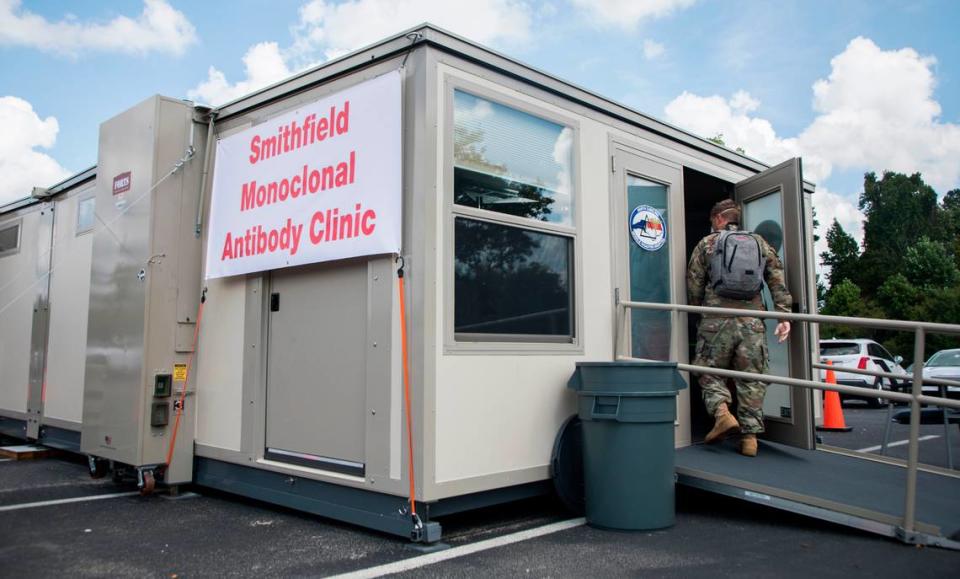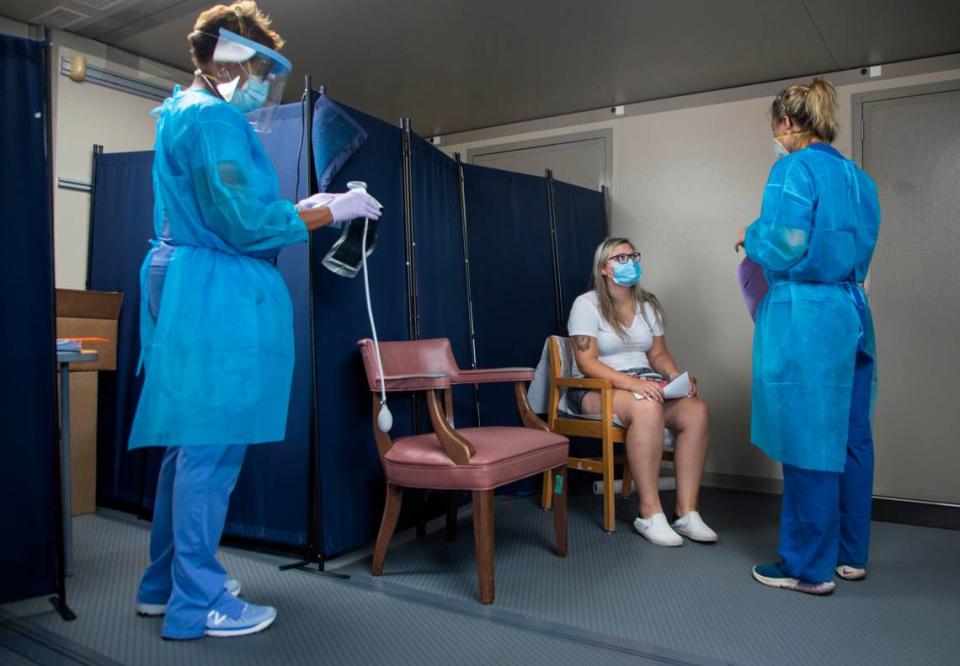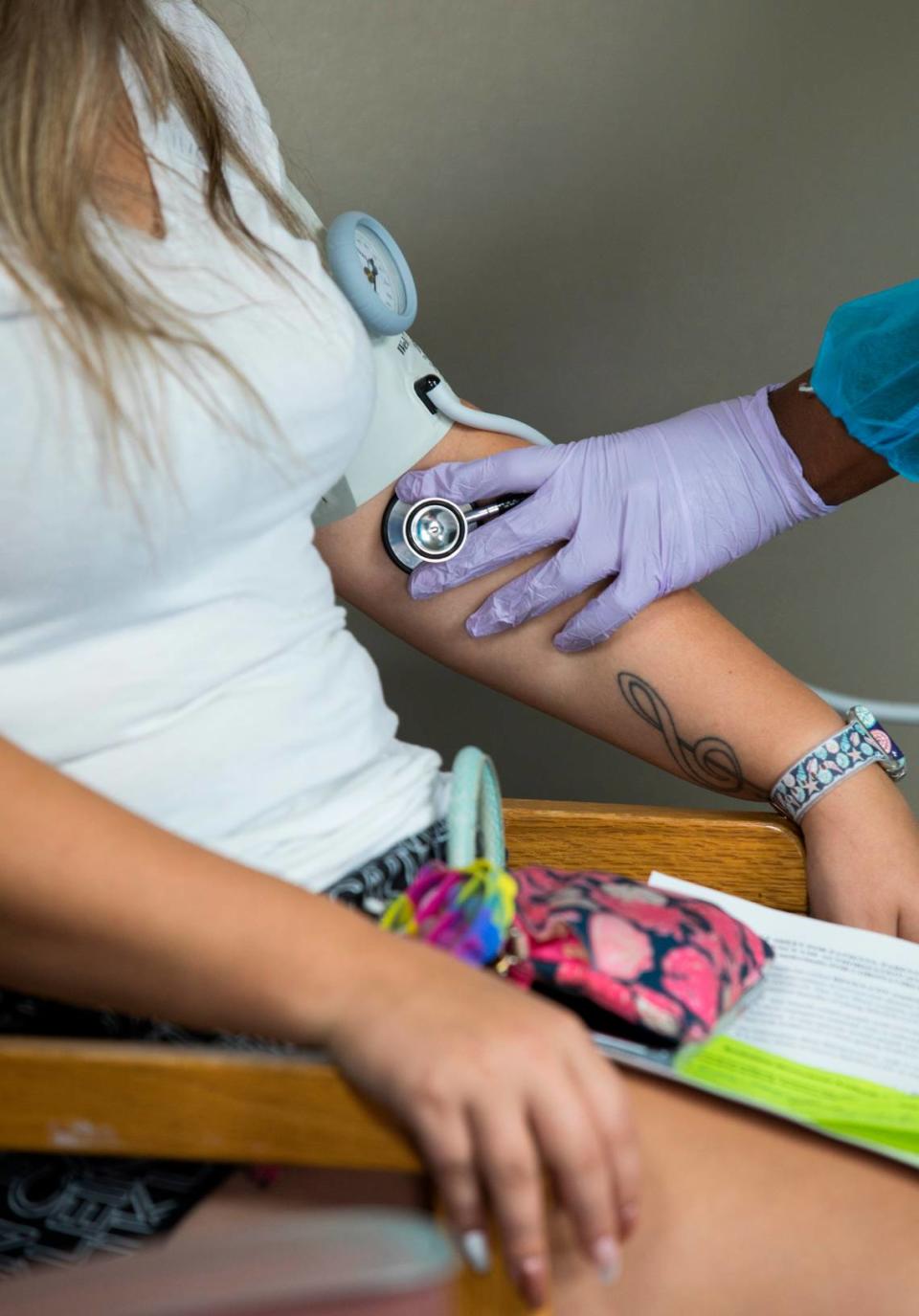NC deploys mobile monoclonal antibody clinics to keep COVID patients out of hospitals
- Oops!Something went wrong.Please try again later.
When the hospitals that make up UNC Johnston Health got overwhelmed with COVID-19 and other patients last month, Ruth Marler, the chief operating officer, asked the state if it could help by setting up a field hospital.
The state said it couldn’t do that, Marler said. But it offered something that might be just as helpful: a portable clinic where people who test positive for COVID-19 can get treated with monoclonal antibodies.
Monoclonal antibodies that attack the coronavirus have been available for nearly a year; they got widespread attention after an infusion was credited with helping President Donald Trump recover from COVID-19 last October.
But demand spiked this summer, as the delta variant of the coronavirus caused the number of cases to soar, particularly among the unvaccinated. Not only does the treatment help patients get better but it prevents people from getting sick enough to need to be admitted to hospitals that are already near capacity.
“We’ve been full at Johnston Health, at both of our sites, both Smithfield and Clayton,” Marler said. “And on some days we were holding up to 25 patients waiting for admission.”

‘A huge increase in demand’
The mobile antibody clinic in the parking lot outside the county health department next to the Smithfield hospital is one of a half dozen the state is opening around North Carolina with help of the Federal Emergency Management Agency. The two adjoining trailers, with “NC Mobile Disaster Hospital” on the doors and powered by a generator, were ready for the first patients Wednesday.
Monoclonal antibodies are lab-grown proteins derived from the natural antibodies of people who have successfully fought off COVID-19. The U.S. Food and Drug Administration allows their use on an emergency basis, making them the only sanctioned treatment for COVID-19 patients before they are hospitalized.
The UNC Health system has treated more than 6,500 people with monoclonals since late last year, more than half of them just since Aug. 1, said spokesman Alan Wolf.
“We’ve seen a huge increase in demand,” Wolf said.

Doctors, public health officials and politicians are promoting monoclonals as a way to ease the pandemic. The federal government, which provides the treatment at no cost to patients, has distributed 1.4 million courses of the treatments, and President Joe Biden said last week it would increase the pace of shipments by 50% this month.
And on Wednesday Gov. Roy Cooper praised monoclonal antibodies during a visit to a clinic in Wilmington.
“While vaccines are our best tool in the fight against COVID-19, monoclonal antibody treatment is available if you do get infected,” Cooper said in a statement. “This treatment will help us save more lives as we work to turn the corner on the pandemic.”
Expanding access in Johnston County
This summer, monoclonal antibodies were available in just one place in Johnston County, at UNC Johnston in Clayton, two days a week. That’s now been expanded to seven days a week, and UNC Johnston has teamed up with Benson Health, a primary care practice, to open a monoclonal clinic there five days a week.
Add in the new clinic in Smithfield, and UNC Johnston hopes to provide the treatment to up to 100 people a day in Johnston County, Marler said.
“That means 100 people that hopefully aren’t going to come to the emergency department, they aren’t going to need to be hospitalized and potentially not lose their lives,” she said. “That’s a really great thing.”
The FDA allows use of monoclonals with patients with a high risk of developing severe COVID-19, including those age 65 or older or who have certain chronic medical conditions such as diabetes or a weakened immune system. Being overweight is also considered a risk factor, Marler notes, as is having close contact with someone else with a medical condition.
“The guidelines are very lenient, so that as many people as possible will qualify,” she said. “We have not turned away anyone at any of our sites so far,” unless they needed hospitalization or had been sick for seven days or longer.
Patients can be referred to the clinics by their doctors, clinics, pharmacies or other places that provide coronavirus tests. Or, in the case of Emmily Mangum of McGees Crossroads, by their mothers.

Mangum, who tested positive for COVID-19 on Tuesday, had not heard of monoclonal antibodies, but her mother had and gave her the number to call for an appointment at the Smithfield clinic.
“I said, ‘If it will make me feel better, sure,’” she said.
Mangum, 25, woke up Sunday feeling congested and aching all over, and suspected it might be COVID. Her treatment Wednesday consisted of four shots — one in each arm and two in her stomach — followed by an hour of observation time.
She didn’t walk out feeling much better, but the shots didn’t hurt. “Just a little pinch,” she said.
It usually takes a day before people start to feel the effects of the treatment, Marler said. Anecdotally, she said, the results have been good.
“Patients call us back the next day and say ‘I feel totally different, I feel so great today,’” she said. “They get it at 4 o’clock in the afternoon, and by noon the next day they’re calling us and saying, I just got to tell you all how great I feel.”
For more information about monoclonal antibody therapy and how to get it, go to covid19.ncdhhs.gov/treatment. In Johnston County, call 919-268-1621.

